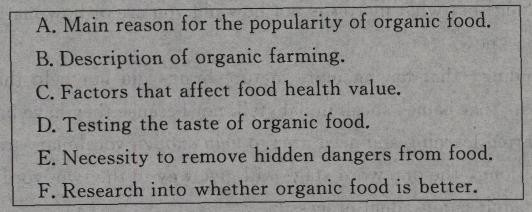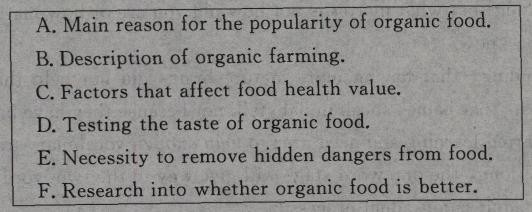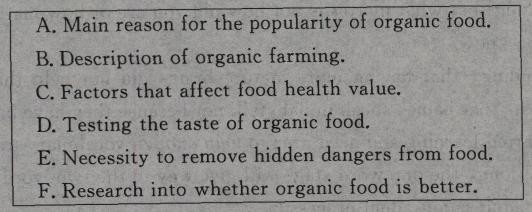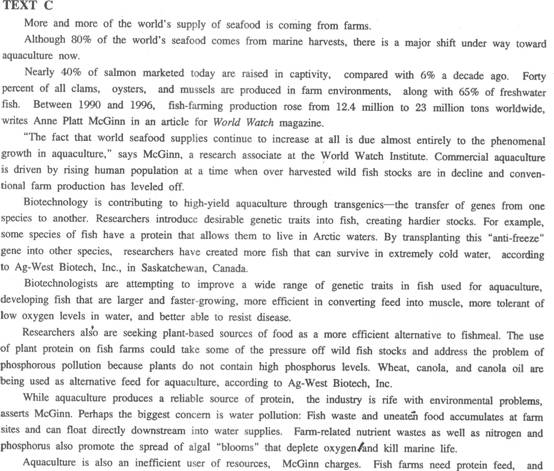 题目内容
(请给出正确答案)
题目内容
(请给出正确答案)
Why do conventional models of the atmosphere fail to predict such a short-lived tornado?
 答案
答案
 请输入或粘贴题目内容
搜题
请输入或粘贴题目内容
搜题
 拍照、语音搜题,请扫码下载APP
拍照、语音搜题,请扫码下载APP
 题目内容
(请给出正确答案)
题目内容
(请给出正确答案)
 答案
答案
 更多“Why do conventional models of the atmosphere fail to predict such a short-lived tornado?”相关的问题
更多“Why do conventional models of the atmosphere fail to predict such a short-lived tornado?”相关的问题
第1题
Do you think conventional retail outlets will decline in future? (Why? / Why not?)
第2题
Sad to say, this project has turned out to be mostly low-level findings about factual errors and spelling and grammar mistakes, combined with lots of head-scratching puzzlement about what in the world those readers really want.
But the sources of distrust go way deeper. Most journalists learn to see the world through a set of standard templates (patterns) into which they plug each day's events. In other words, there is a conventional story line in the newsroom culture that provides a backbone and already-made narrative structure for otherwise confusing news.
There exists a social and cultural disconnect between journalists and their readers, which helps explain why the "standard templates" of the newsroom seem alien to many readers. In a recent survey, questionnaires were sent to reporters in five middle-size cities around the country, plus one large metropolitan area. Then residents in these communities were phoned at random and asked the same questions.
Replies show that compared with other Americans, journalists are more likely to live in upscale neighborhoods, have maids, own Mercedeses, and trade stocks, and they're less likely to go to church, do volunteer work, or put down roots in a community. Reporters tend to be part of a broadly defined social and cultural elite, so their work tends to reflect the conventional values of this elite. The astonishing distrust of the news media isn't rooted in inaccuracy or poor reportorial skills but in the daily clash of world views between reporters and their readers.
This is an explosive situation for any industry, particularly a declining one. Here is a troubled business that keeps hiring employees whose attitudes vastly annoy the customers. Then it sponsors lots of symposiums and a credibility project dedicated to wondering why customers are annoyed and fleeing in large numbers. But it never seems to get around to noticing the cultural and class biases that so many former buyers are complaining about. If it did, it would open up its diversity program, now focused narrowly on race and gender, and look for reporters who differ broadly by outlook, values, education, and class.
What is the passage mainly about?
A.Needs of the readers all over the world.
B.Causes of the public disappointment about newspapers.
C.Origins of the declining newspaper industry.
D.Aims of a journalism credibility project.
第3题
The News Industry in US
Why do so many Americans distrust what they read in their newspapers? The American Society of Newspaper Editors is trying to answer this painful question. The organization is deep into a long serf-analysis known as the journalism credibility project.
Sad to say, this project has turned out to be mostly low-level findings about factual errors and spelling and grammar mistakes, combined with lots of head-scratching puzzlement about what in the world those readers really want.
But the sources of distrust go way deeper. Most journalists learn to see the world through a set of standard templates (patterns) into which they plug each day's events. In other words, there is a conventional story line in the newsroom culture that provides a backbone and a ready-made narrative structure for otherwise confusing news.
There exists a social and cultural disconnect between journalists and their readers, which helps explain why the "standard templates" of the newsroom seem alien to many readers. In a recent survey, questionnaires were sent to reporters in five middle-size cities around the country, plus one large metropolitan area. Then residents in these communities were phoned at random and asked the same questions.
Replies show that compared with other Americans, journalists are more likely to live in upscale neighborhoods, have maids, own Mercedeses, and trade stocks, and they're less likely to go to church, do volunteer work, or put down roots in a community.
Reporters tend to be part of a broadly defined social and cultural elite, so their work tends to reflect the conventional values of this elite. The astonishing distrust of the news media isn't rooted in inaccuracy or poor reportorial skills but in the daily clash of world views between reporters and their readers.
This is an explosive situation for any industry, particularly a declining one. Here is a troubled business that keeps hiring employees whose attitudes vastly annoy the customers. Then it sponsors lots of symposiums and a credibility project dedicated to wondering why customers are annoyed and fleeing in large numbers. But it never seems to get around to noticing the cultural and class biases that so many former buyers are complaining about. If it did, it would open up its diversity program, now focused narrowly on race and gender, and look for reporters who differ broadly by outlook, values, education, and class.
What is the passage mainly about?
A.Needs of the readers all over the world.
B.Causes of the public disappointment about newspapers.
C.Origins of the declining newspaper industry.
D.Aims of a journalism credibility project.
第4题
Organic food: Why?
1. Europeis now the biggest market for organic food in the world, expanding by 25percent a year over the past 10 years. So what is the attraction of organicfood for some people? The really important. thing is that organic sounds more"natural". Eating organic is a way of defining oneself as natural,good, caring, different from the junk-food-eating masses.
2. Unlike conventionalfarming, the organic approach means farming with natural, rather than man-made,fertilisers and pesticides. Techniques such as crop rotation(轮种)improve soil qualityand help organic farmers compensate for the absence of man-made chemicals. As amethod of food produc- tion, organic is, however, inefficient in its use oflabour and land; there are severe limits to how much food can be produced.Also, the environmental benefits of not using artificial fertilisers are tinycom- pared with the amount of carbon dioxide emitted(排放)by transportingfood.
3. Organic farming is oftenclaimed to be safer than conventional farming. Yet studies into organic farmingworldwide continue to reject this claim. An extensive review by the UK FoodStandards Agen- cy found that there was no statistically significant differencebetween organic and conventional crops. Even where results indicated there wasevidence of a difference, the reviewers found no sign that these differenceswould have any noticeable effect on health.
4. The simplistic claimthat organic food is more nutritious than conventional food was always likelyto be misleading. Food is a natural product, and the health value of differentfoods will vary for a number of reasons, including freshness, the way the foodis cooked, the type of soil it is grown in, the amount of sunlight and raincrops have received, and so on. Likewise, the flavour of a carrot has less todo with whether it was fertilised with manure(粪便) or something out of a plastic sack than with thevariety of carrot and how long ago it was dug up. 5. The notion that organic food is saferthan "normal" food is also contradicted by the fact that many of ourmost common food are full of natural toxins(毒素). As one research expert says : "People thinkthat the more natural something is, the better it is for them. That is simplynot the case. In fact, it is the opposite that is true: the closer a plant isto its&39;natural state, the more likely it is that will poison you. Naturally,many plants do not want to be eaten, so we have spent 10,000 years developingagriculture and breeding out harmful traits from, crops. "
Paragraph l

Paragraph 2

Paragraph 3

Paragraph 4

Techniques of organic farming help

There is no convincing evidence to

The weather conditions during the growth of crops

The closer a plant is to its natural state, the less suitable it is to

请帮忙给出每个问题的正确答案和分析,谢谢!
第5题
听力原文: Are electric cars the way of the future?Automobile manufactures are under pressure to develop cars that do not pollute.One powerful motive is a California law requiring that by the year 2020 ten percent of new car sells in the state be so called zero-emission vehicles.These cars must put no pollutants whatsoever into the at-mosphere.
California is a huge market for the automobile companies,so they are working hard to meet these standards. So far the electric car seems to be the best alternative.So the big advantage of electric cars is that they don't pollute.However they will be in competition with gas-powered cars and that's where the weaknesses come out.The big problem is that the batteries that power electric cars weigh a lot relative to the amount of power they deliver.For instance,in one prototype electric car,the batteries weighed 400 kilograms.And they provide enough energy to go 250 kilometers before recharging,which takes eight hours.Compare that to a moderately fuel-efficient conventional car,it can go 600 to 700 kilometers on a tank of gas and refilling takes just minutes.If there are other drains on an electric car's batteries besides the motor,headlights,air-conditioning or a heater,its already limited range will be significantly reduced.So automobile engineers are trying to make more powerful batteries that would increase the cars'range and make them more attractive to buyers.
Why does the electric car seem to be the best alternative so far?
A.It is comfortable.
B.It is best made.
C.It causes no pollution.
D.It makes less noise.
第6题
By citing me example of his music teacher, the author tries to______.
A.reveal underlying problems in current education system
B.prove the necessity of reviving traditional education
C.complain about some educators" abuse of policies
D.explain why the conventional wisdom is wrong
第7题
According to the governor, why should one use solar panels?
A.The new law requires every resident to install them.
B.They are environmentally friendly and efficient.
C.The energy industry needs to be supported.
D.They costs less to install than the conventional method.
第8题
The child's rapid acquisition of political knowledge also promotes the growth of political ideology during adolescence. By knowledge I mean more than the dull "facts" such as the composition of country government, that the child is exposed to in the conventional ninth-grade school course. Nor do I mean only information on current political realities. These are facts of knowledge, but they are less critical than the adolescent's absorption of a feeling for those many unspoken assumptions about the political system that comprise the common ground of understanding, for example, what the state can "appropriately" demand of its citizens, and vice versa, or the "proper" relationship of government to subsidiary social institutions, such as the schools and churches. Thus, political knowledge is the awareness of social assumptions and relationships as well as of objective facts. Much of the naivete that characterizes the younger adolescent's grasp of politics stems not from an ignorance of "facts" but from an incomplete comprehension of the common conventions of the system, of which is and not customarily done, and of how and why it is or is not done.
Yet I do not want to over-emphasize the significance of increased political knowledge in forming adolescent ideology, Over the years I have become progressively disenchanted about the centrality of such knowledge and have come to believe that much current work in political socialization, by relying too heavily on its apparent acquisition, has been misled about the tempo of political understanding in adolescence. Just as young children can count numbers in series without grasping the principle of ordination, young adolescents may have in their heads many random hits of political information without a secure understanding of those concepts that would give order and meaning to the information.
Children's minds pick up bits and pieces of data, but until the adolescent has grasped the encompassing function that concepts and principles provide, the data remain fragmented, random, disordered.
The author's primary purpose in the text is to ______.
A.clarify the kinds of understanding an adolescent must have in order to develop a political ideology
B.dispute the theory that a political ideology can be acquired during adolescence
C.explain why adolescents are generally uninterested in political arguments
D.suggest various means of encouraging adolescents to develop personal political ideologies
第9题
根据下面材料,回答{TSE}题.
 {TS}All the following statements are the masons why commercial aquaculture is pushed forward EXCEPT
{TS}All the following statements are the masons why commercial aquaculture is pushed forward EXCEPT
A. the human population is increasing fast.
B. the wild fish stocks are decreasing due to over fishing.
C. the cost of developing aquaculture is comparatively low.
D. there is no improvement in conventional farm production.
第10题
In America alone, tipping is now a $16 billion-a-year industry. Consumers acting rationally ought not to pay more than they have to for a given service. Tips should not exist. So why do they? The conventional wisdom is that tips both reward the efforts of good service and reduce uncomfortable feelings of inequality. The better the service, the bigger the tip.
Such explanations no doubt explain the purported origin of tipping—in the 16th century, boxes in English taverns carried the phrase "To Insure Promptitude" (later just "TIP"). But according to new research from Cornell University, tipping no longer serves any useful function.
The paper analyses data from 2,547 groups dining at 20 different restaurants. The correlation between larger tips and better service was very weak: only a tiny part of the variability in the size of the tip had anything to do with the quality of service. Customers who rated a meal as "excellent" still tipped anywhere between 8% and 37% of the meal price.
Tipping is better explained by culture than by economics. In America, the custom has become institutionalized: it is regarded as part of the accepted cost of a service. In a New York restaurant, failing to tip at least 15% could well mean abuse from the waiter. Hairdressers can expect to get 15-20%, the man who delivers your groceries $2. In Europe, tipping is less common; in many restaurants, discretionary tipping is being replaced by a standard service charge. In many Asian countries, tipping has never really caught on at all.
How to account for these national differences? Look no further than psychology. According to Michael Lynn, the Cornell paper's co-author, countries in which people are more extrovert, sociable or neurotic tend to tip more. Tipping relieves anxiety about being served by strangers. And, says Mr. Lynn, "In America, where people are outgoing and expressive, tipping is about social approval. If you tip badly, people think less of you. Tipping well is a chance to show off." Icelanders, by contrast, do not usually tip—a measure of their introversion, no doubt.
While such explanations may be crude, the hard truth seems to be that tipping does not work. It does not benefit the customer. Nor, in the case of restaurants, does it actually stimulate the waiter, or help the restaurant manager to monitor and assess his staff. Service people should "just be paid a decent wage" which may actually make economic sense.
Which is tree according to the passage?
A.It is regulated that the customers must pay a tip if they want to get good service.
B.There exists the tipping custom in each country.
C.In some countries, tipping has become an industry.
D.More and more people are in favor of tipping.